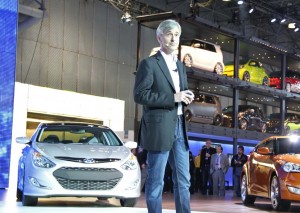The controversy over Hyundai’s misstated fuel economy ratings has not hurt the Korean automaker’s sales, Hyundai of America chief executive officer John Krafcik told TheDetroitBureau.com.
The maker earlier this month admitted it had overstated the mileage of 900,000 vehicles sold in the U.S. – as did its sibling brand Kia. In some cases, the two brands were forced to reduce the ratings of models like the Kia Soul by as much as 6 mpg.
Hyundai faces some hefty fines, the threat of lawsuits and the millions of dollars it has offered to reimburse affected owners. A number of analysts, meanwhile, have warned the flap could have a strongly negative impact on Kia’s record-pace sales. But Krafcik insisted that isn’t happening.
Krafcik said Hyundai sales momentum basically remains intact and declined to comment on suggestions from independent analyst, suggesting the cost of rolling back the fuel-economy ratings on several models – a move ordered by the US Environmental Protection Agency – could come to as much as $1 billion.
“I don’t know what the numbers are going to be,” Krafcik said.
Hyundai of America will remain profitable this year despite the uproar over fuel economy, Krafcik said after revealing two models during the first media day at the 2012 LA Auto Show. They included an extended wheelbase, seven-passenger version of the Santa Fe crossover due in showrooms in January, along with a concept vehicle with a soft top based on the Hyundai Veloster.
Hyundai no long claims in its advertising that it has vehicles that get better than 40 miles per gallon, Krafcik noted. The EPA ordered Hyundai to reduce the fuel-economy ratings right across its model line after an audit uncovered discrepancies it the test procedures used in test center in Ann Arbor, Mi. Like other manufacturers, Hyundai conducted the tests and then certified the results for the EPA – the data then posted on the “Munroney” window stickers consumers can use to compare models at dealer showrooms..
Krafcik said Hyundai’s first priority right now is taking care of existing customers. “It’s certainly a challenge for us,” he said, adding, “We’re in a place now where for some customers are thinking, we have a little more to prove.”
But Krafcik doesn’t believe there will be any long term damage to the brand.
Krafcik said Hyundai remains short of vehicle, despite adding a third shift at its U.S. assembly plant in West Point, Georgia. Both the new short-wheelbase Santa Fe and the Accent remain in short supply despite the fuel-economy controversy.
Demand for new vehicles is expected to expand again in 2013 but even if the current crisis doesn’t scare off potential buyers, Hyundai could have a hard time holding onto market share because of the limits on vehicle availability.

